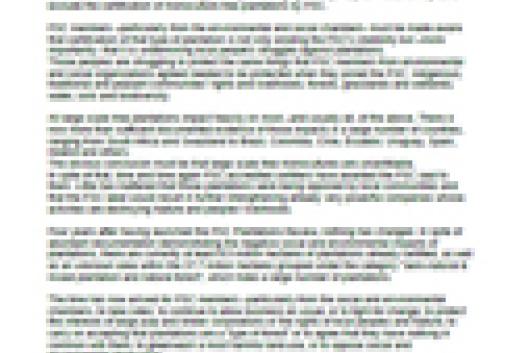The Subsidiary Body on Scientific, Technical and Technological Advice (SBSSTA) of the Convention on Biological Diversity (CBD), will hold its thirteenth meeting in Rome from 18 to 22 February 2008.
In the meeting’s agenda there are two items of extreme importance for WRM’s concerns: forest biodiversity and invasive alien species. Though they will be treated separately (the former by the full meeting and the latter by a working group), we believe that they are inextricably linked.
Invasive alien species are a major cause of biodiversity loss in forests and other ecosystems, but the issue of invasive alien tree plantation species is rarely mentioned or addressed, in spite of the fact that some species of eucalyptus, pines and acacias have already become invasive in many countries (e.g. in South Africa, Chile, USA, Uruguay and others).
Although there are many definitions about the meaning of the concept “alien invasive species”, perhaps the most accepted one defines them as non-indigenous species that adversely affect the habitats they invade economically, environmentally or ecologically.
For any “adversely affected habitat” it doesn’t matter much how the invasion occurred: if the wind, water, birds or animals brought in the seeds of plant species that later spread spontaneously in that habitat or if those species were introduced by plantation companies and resulted in adverse economic, environmental or ecological effects.
In line with the above, all large-scale, monoculture, alien tree plantations are considered to be invasive by local communities whose habitats –and therefore also livelihoods- are negatively affected by such plantations. Because of the impacts on biodiversity resulting from the large scale planting of alien species as monocultures, they should also be addressed as dangerous invasive alien species by the Convention on Biodiversity.
In that respect, the SBSSTA experts should raise and answer the basic question: does such type of alien tree plantation adversely affect the habitats they invade or not? In case they do, it is clear that from a biodiversity conservation perspective they should be banned in the same way as trade in seeds and plants of other invasive species (e.g. Lantana camara, Solanum mauritianum) has been prohibited in many countries.
Similar questions should be raised and answered regarding genetically engineered trees. Is there a risk that they could adversely affect habitats economically, environmentally or ecologically? Could they spread spontaneously? Could their pollen pollute other species? If the answer to these questions is positive, then the COP8 decision urging to apply the Precautionary Principle should be upgraded to a total ban on the release of GE trees.
Though plantation species can spread spontaneously through wind, water, birds or animals –and the same can happen with GE trees- plantations themselves do not simply occur. Neither does research on GE trees. Both are the result of corporate decisions aimed at increasing their profits.
In that light, if we look at the biodiversity issue from a political and economic perspective, it is clear that transnational corporations are the most dangerous invasive alien species of all. As their natural invasive counterparts do, they invade lands and forests and destroy habitats that provided the means of living to countless other species and to local people.
In this bulletin (and many more can be found in the previous 125 issues), there are sufficient examples to prove the above: mining corporations in India, Congo, Bangladesh; pulp and paper corporations in Chile and the USA; oil and logging corporations in Ecuador; palm oil corporations in Indonesia; polluting corporations in Zimbabwe. All of them are invading and destroying biodiversity-rich habitats and local peoples’ livelihoods.
However, we don’t expect SBSSTA to address that fundamental issue. What we do expect is something more in line with its mandate as advisory body to the CBD:
- that it adopts a definition of forests that excludes large scale plantations as such
- that it urges the CBD to recommend governments to halt the expansion of large scale monocultures of alien tree species
- that it recommends the CBD to ban the plantation of tree species that have already proven to be invasive
- that it recommends the CBD to ban GE trees
Those would be very positive outcomes from this SBSSTA meeting for both people and biodiversity.
By the World Rainforest Movement - Article published in the English edition of WRM Bulletin, Nº 126, January 2008.
